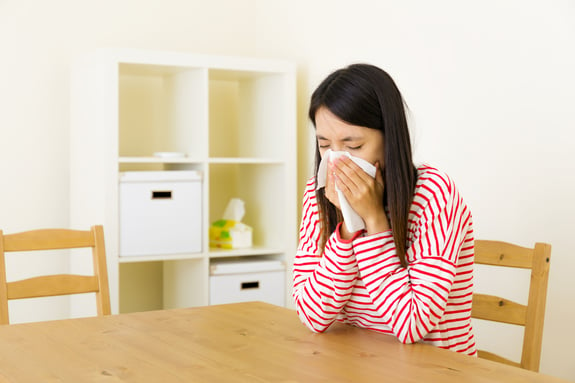Rhinitis is an inflammatory disease of the nasal mucosa that is accompanied by one or more symptoms of runny nose, sneezing, itching, and nasal congestion. It is a term that encompasses several types of rhinitis. Acute rhinitis is an infectious rhinitis that often refers to a cold, but chronic rhinitis can be divided into infectious and non-infectious depending on the cause.
Cause
Causes of non-infectious chronic rhinitis include nasal structure abnormalities, nasal tumors, autonomic nervous system imbalance, hormonal abnormalities, drugs, emotional instability, etc. Chronic rhinitis may also occur. Infectious rhinitis caused by bacteria may occur repeatedly due to incomplete treatment for a cold, rhinitis caused by sinusitis or repeated tonsillitis for a long time, or continuous sinusitis or tonsillitis.
Symptom
Most chronic rhinitis is similar in appearance, only the severity of symptoms differs regardless of the cause. The most common symptoms are runny nose and nasal congestion. If both nostrils are blocked, mouth breathing may occur. Inflammation can also cause paroxysmal sneezing when nerves in the nasal mucosa are exposed. Loss of smell or loss of smell may also occur.
Diagnosis/Test
Although rhinitis refers to an inflammatory disease of the nasal mucosa, it is difficult to confirm the inflammatory response in the nasal cavity itself at the time of actual diagnosis. Diagnosis is made based on the patient's medical history and symptoms and the results of the nasal endoscopy, and allergic reaction test, nasal smear test, and bacterial culture test can be performed together.
Cure
Treatment methods vary depending on the type of rhinitis. Allergic rhinitis is treated with drug therapy, avoidance of the causative antigen, antihistamines, topical steroids, antileukotrins, anticholinergic sprays, or immunotherapy. Surgical treatment includes turbinate plastic surgery, turbinate resection, laser surgery, and high-frequency surgery. For vasomotor rhinitis, topical steroids or anticholinergic sprays are used, and for drug rhinitis, drugs are not used.
Progress/Complications
If the cause is clear, treatment can improve it sufficiently, but otherwise, it can lead to long-lasting, chronically inflamed, thickened nasal mucosa and irreversible swelling of the nasal mucosa in the nasal cavity and turbinate. Chronic rhinitis can cause complications such as lacrimal cystitis, conjunctivitis, otitis externa, otitis media, and laryngitis.
Prevention/Lifestyle
It is difficult to prevent rhinitis, but effort and treatment must be combined to prevent it to some extent. It is recommended to control the humidity so that it does not dry out. Wash your hands thoroughly to avoid catching a cold, and beware of sudden temperature changes. It is recommended to wash the nose with saline in the morning and evening. Avoiding rhinitis triggers, such as tobacco smoke and soot, can also help prevent it.
FAQ
Q. What foods are good for chronic rhinitis?
A. Some foods or medicines are mentioned on the Internet or in oriental medicine clinics, but from the point of view of evidence-based medicine, rhinitis is not treated with food. However, please be careful as excessive drinking may worsen nasal symptoms.
Q. What are the similarities and differences between chronic rhinitis and allergic rhinitis?
A. One of the causes of chronic rhinitis is allergic rhinitis. Therefore, they cannot be divided into commonalities and differences.
Q. Can chronic rhinitis be treated with folk remedies?
A. Unlike in the past, medical information has recently been easily obtained through mass media such as newspapers, broadcasts, and magazines, or through the Internet, but unverified information is indiscriminately circulating, which often confuses medical consumers. There is. If you are having a hard time deciding, it is the safest way to get advice from an allergist near you.

Comments